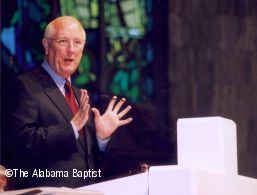It is bill-paying time. Perhaps it is the first of the month, the 15th or whatever schedule on which one might be paid. There is the electric bill, the gas bill, the water bill, the mortgage and all the others that have accumulated since the last time bills were paid.
In the stack of bills are the offering envelopes from the church. It is time to write a check to the church, too. Baptists often say the first check one should write should be to the church. That keeps God a priority. It helps one be obedient and not give God the leftovers after he or she has cared for himself or herself.
“Obedient.” That might be the right word. One writes a check to the church to be obedient. But is it also an act of worship? Sometimes writing a check to the church, along with paying all the other regular bills, seems like obedience. One has done his or her duty. Another bill is paid, this one to the church. But if it is only a routine act, then the experience is far from an act of worship.
Of course, Baptists do not often treat the time for offerings like an act of worship. Ever since Baptists started using the six-point record system in the early 1900s, members have been encouraged to turn in their offering during Sunday School. Under the system, one marks the box “Giving to the Church,” along with “Present,” Studied Lesson,” “Daily Bible Reading,” “Brought Bible” and “Attending Church;” places the offering in the envelope; and hands it to the class secretary.
The system was great to encourage regular giving. It was not uncommon for 90 percent or more of the weekly offering to come in through Sunday School. But it had little to do with worship. When the offering plate was passed in the worship service, it was just handed from person to person and frequently remained empty. One could always tell who had not been in Sunday School. They were the ones who put something in the offering plate.
Few churches use the system anymore, but churches still make it easy for one to be “obedient” and give an offering. Weekly offering envelopes are still provided. Many churches allow members to give by credit card. Numerous churches expect “the eagle to fly,” a reference to offerings mailed in by members who cannot be present. Some churches even ask members to allow their offerings to be electronically deducted from their bank accounts on a regular basis. When offering plates are passed during services, the most common reason for giving advocated is to be obedient. After that, it is to finance the work of the church. In most places, little is said about giving as an act of worship.
The Old Testament is clear about offerings and sacrifices. From the beginning of time, Adam and his family brought physical elements as acts of worship before God to express their devotion, thanksgiving and plea for forgiveness.
The Old Testament commanded the Jews to make burnt offerings, grain offerings, peace offerings, sin offerings and guilt offerings. Deuteronomy 14:28–29 stipulated the tithe was to be used to care for the Levites, orphans, widows and foreigners. By New Testament times, rabbis taught that the faithful were to give three tithes: one for support of the temple system, one for praise and thanksgiving to God and one for charity.
Always the temptation was to trust in the sacrificial system’s tithes and offerings as sufficient to be right with God, to be obedient. Repeatedly the prophets condemned the people because they ignored the elements of faith, confession and devotion.
In the first chapter of Isaiah, the prophet said God rejects the nation’s sacrifices. Instead God calls it to “Stop doing wrong, learn to do right. Seek justice, encourage the oppressed. Defend the cause of the fatherless, plead the case of the widow” (Isa. 1:16–17). Jeremiah taught that the symbols of sacrifice must be expressed in individual lives. Micah echoed Isaiah’s words, calling on the people to “act justly and to love mercy and to walk humbly with your God” (6:6–8). Malachi accused the people of despising God by their lack of obedience — offering sick and lame animals instead of ones “without blemish” as the Law required.
One wonders what Malachi would say to Baptists today who give, on average, about 2 percent of their income as a sacrifice to God through the work of their local church. Would the prophet condemn our meager sacrifices as demonstrations of selfishness? Would he say our offerings show contempt for God’s command rather than devotion to it?
Even though the once-for-all sacrifice of Jesus on Calvary’s cross (Heb. 10:12) ended the animal sacrificial system for Christians, the Bible teaches believers to offer sacrifices of a different kind. Hebrews 13:15–16 says, “Through Jesus, therefore, let us continually offer to God a sacrifice of praise — the fruit of lips that confess His name. And do not forget to do good and to share with others, for with such sacrifices God is pleased.”
Jesus was more pointed. In Matthew 23:23, He told the Pharisees they should have tithed and observed the “more important matters of the Law — justice, mercy and faithfulness.” His words sound like those of Isaiah, Jeremiah and Micah.
In 1 Peter 2:5, the apostle wrote that believers are a “holy priesthood offering spiritual sacrifices to God.” It is impossible to miss the Old Testament connection between priesthood and sacrifice. It is impossible to miss the connection between obedience to God and what the apostle Paul calls “living sacrifices holy and pleasing to God” (Rom. 12:1).
As the check is written to the church or the money is placed in an offering plate, Christians are still bringing a physical element as an act of worship before God, as an expression of devotion and thanksgiving. But being obedient by making an offering is not enough. It never was.
An offering is supposed to be an expression of loving God with heart, mind, soul and strength. It is an expression giving one’s self to God. It is an act of worship. Nothing less meets God’s demands.





Share with others: